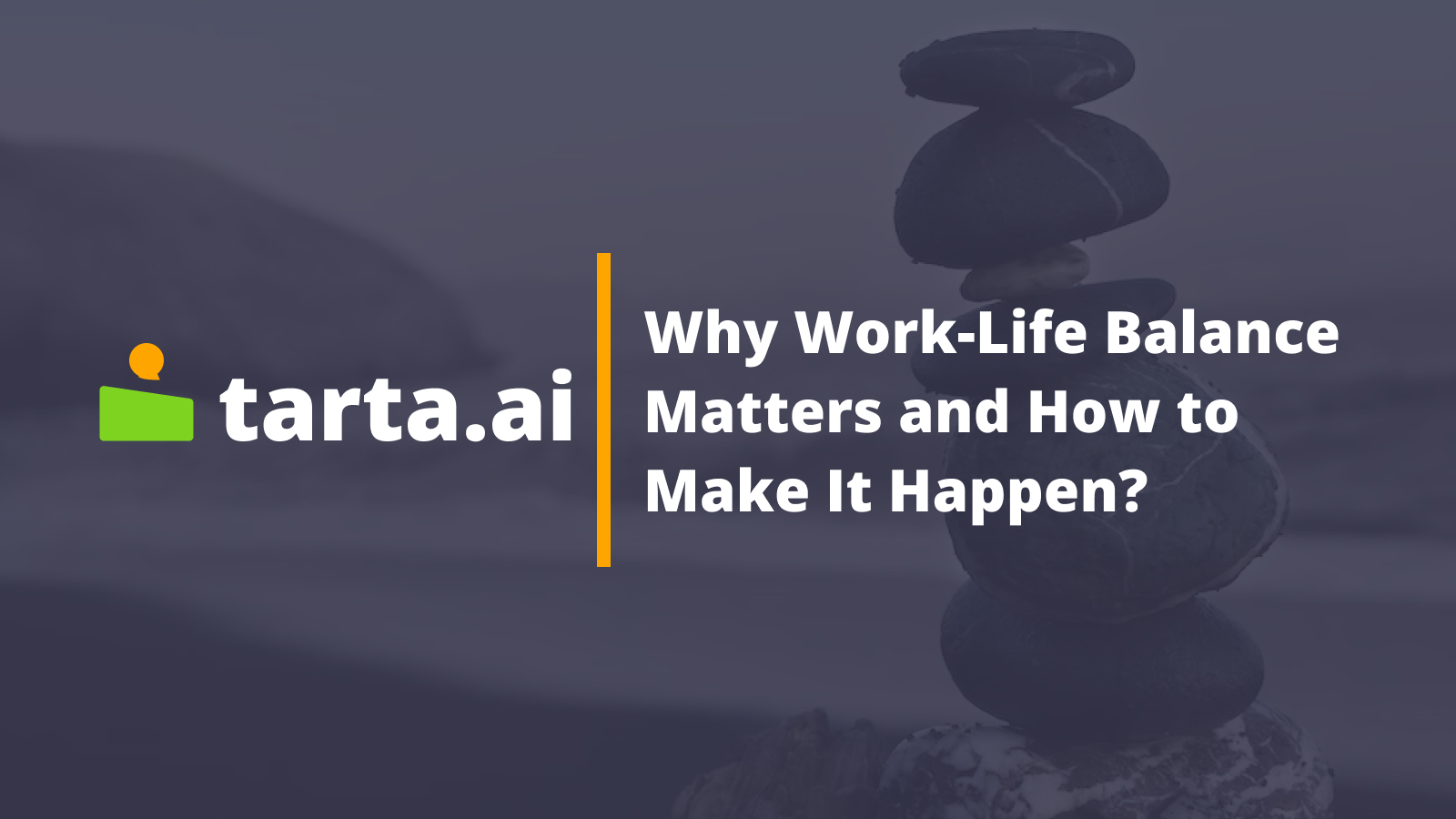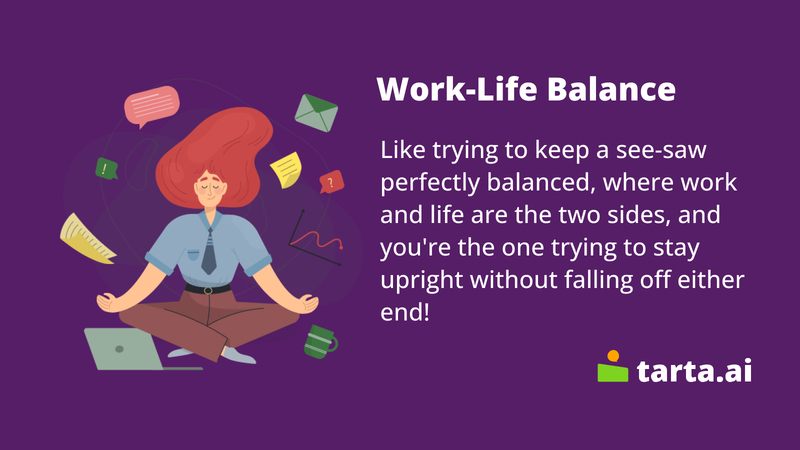Why Work-Life Balance Matters and How to Make It Happen?

In today's fast-paced world, it can be challenging to balance the demands of work and personal life. We often find ourselves caught up in the daily grind, struggling to keep up with work deadlines while also trying to make time for family, friends, and self-care. This is where the concept of work-life balance comes in.
Work-life balance refers to the ability to balance the demands of work and personal life in a way that allows us to meet our responsibilities without sacrificing our health and well-being. It involves finding a sustainable rhythm between work and other aspects of life that brings us fulfillment and happiness.
The importance of work-life balance cannot be overstated. Research has shown that an imbalance between work and personal life can lead to burnout, stress, and mental health issues. It can also have a negative impact on work productivity, job satisfaction, and personal relationships. Therefore, it is crucial to find ways to achieve work-life balance.
In this article, we will explore why work-life balance matters and provide tips on how to make it happen. By the end of this article, you will have a better understanding of the benefits of work-life balance and strategies for achieving it.
The Consequences of an Imbalanced Life
Despite our best efforts, achieving work-life balance can be difficult. When we fail to strike a balance between our work and personal lives, we may experience negative consequences that affect our overall well-being. Here are some of the negative effects of work-life imbalance:
- Burnout: A state of emotional, physical, and mental exhaustion caused by prolonged stress and overwork. Burnout can lead to feelings of cynicism, detachment, and reduced job satisfaction.
- Stress: The feeling of being overwhelmed or under pressure due to demands from work, family, or other responsibilities. Chronic stress can lead to physical and mental health problems such as heart disease, depression, and anxiety.
- Health problems: An imbalanced life can lead to a sedentary lifestyle, poor eating habits, and lack of exercise, which can result in obesity, high blood pressure, and other health problems.
- Relationship issues: When we spend too much time at work, it can take a toll on our personal relationships. Neglecting our partners, children, and friends can lead to feelings of isolation, loneliness, and strain in our relationships.

Here are some examples of work-life imbalance consequences:
- A busy executive who works long hours and travels frequently may miss important family events, such as children's recitals or soccer games.
- A single parent who works two jobs to make ends meet may struggle to find time for self-care, leading to chronic stress and burnout.
- An entrepreneur who is passionate about their business may neglect their health, resulting in poor eating habits, lack of exercise, and health problems.
In the next section, we'll explore the benefits of work-life balance and why it's important to strive for it.
Benefits of Work-Life Balance
Achieving work-life balance has numerous benefits that can positively impact all areas of our lives. Here are some of the key benefits:
Physical and mental health benefits
An imbalanced life can lead to stress and health problems. On the other hand, achieving work-life balance can reduce stress levels, improve sleep, and boost our immune system, resulting in better physical and mental health.
Improved work productivity and job satisfaction
When we achieve work-life balance, we are more likely to be productive and focused at work. We may also experience higher job satisfaction, leading to improved job performance and career success.
Better personal relationships
Balancing work and personal life can strengthen our personal relationships. Spending quality time with loved ones can foster deeper connections and help us feel more connected to those who matter most.
Enhanced quality of life
Achieving work-life balance can help us enjoy life more fully. It allows us to pursue hobbies and interests, travel, and explore new things, resulting in a more fulfilling life.
By achieving work-life balance, we can experience these benefits and live a happier, healthier, and more meaningful life. In the next section, we'll explore how to achieve work-life balance.
Interesting fact:
According to a study by the American Psychological Association, work is the second most common source of stress, after money.
How to Achieve Work-Life Balance
Achieving work-life balance may seem daunting, but it is achievable with some effort and intentional actions. Here are some strategies to help you achieve work-life balance:
Strategy | Description |
Set priorities and boundaries | Identify what is most important to you in both your personal and professional life. Then, set boundaries to protect your time and energy to ensure that you prioritize those things. For instance, you can set specific work hours and stick to them, avoid checking work emails or answering work calls outside of those hours, and communicate your boundaries clearly with your coworkers. |
Learn to say no | It's okay to say no when you're feeling overwhelmed or when taking on additional responsibilities will prevent you from achieving work-life balance. Learn to say no to work tasks or social events that don't align with your priorities and values. |
Take breaks and vacations | Taking regular breaks during work and going on vacation can help you recharge and prevent burnout. Use your vacation time to disconnect from work and engage in activities that bring you joy and relaxation. |
Make time for hobbies and interests | Set aside time for hobbies, interests, and self-care activities that bring you joy and help you recharge. It can be as simple as reading a book, going for a walk, or practicing meditation. |
Use technology wisely | Technology can be a helpful tool to stay connected, but it can also blur the lines between work and personal life. Set boundaries around your technology use, such as avoiding checking work emails or answering work calls during personal time. |
Seek support and assistance | Don't be afraid to ask for help when you need it. Seek support from your friends, family, or a mental health professional if you're feeling overwhelmed or struggling to achieve work-life balance. |
By implementing these strategies, you can create a more balanced life that prioritizes your well-being and happiness. Remember that achieving work-life balance is a journey, not a destination, and it requires ongoing effort and commitment.

Photo: Thought Catalog/Unsplash
Work-Life Balance Techniques
In addition to the strategies discussed earlier, there are specific techniques you can use to achieve work-life balance. Here are some of the most effective ones:
- Time management strategies: Effective time management can help you prioritize tasks, eliminate distractions, and maximize productivity. Examples include using a to-do list, setting realistic deadlines, breaking down tasks into manageable chunks, and utilizing tools like calendars and scheduling software.
- Mindfulness and relaxation techniques: Mindfulness and relaxation techniques, such as deep breathing, meditation, yoga, or tai chi, can help you reduce stress, improve focus, and increase your overall well-being. Practicing these techniques regularly can help you stay centered and calm, even in the face of work-related stress.
- Exercise and physical activity: Regular exercise and physical activity can help you reduce stress, improve mood, and boost energy levels. Find an activity that you enjoy and make it a regular part of your routine, whether it's going for a walk, hitting the gym, or taking a dance class.
- Social connections and networking: Maintaining social connections and building your network can provide you with emotional support, guidance, and new opportunities. Make time to connect with friends, family, and colleagues, attend networking events, or join professional organizations.
- Goal setting and personal development: Setting goals for yourself, both personally and professionally, can help you stay motivated and focused. Regularly assess your progress, adjust your goals as needed, and invest in your personal and professional development through classes, workshops, or mentorship.
By incorporating these techniques into your life, you can create a more balanced and fulfilling life that aligns with your priorities and values. Remember that work-life balance is not a one-size-fits-all solution, so experiment with different techniques to find what works best for you.

Photo: Colton Sturgeon/Unsplash
Achieving work-life balance is essential for your overall well-being, personal relationships, and career success. By creating a more balanced life, you can reduce stress, increase productivity, and improve your quality of life.
In this article, we discussed the negative consequences of an imbalanced life and the benefits of work-life balance, including physical and mental health benefits, improved productivity, and better personal relationships. We also explored various strategies and techniques that can help you achieve work-life balance, such as time management, mindfulness, exercise, social connections, and personal development.
Remember, achieving work-life balance is a journey, not a destination. It requires ongoing effort, commitment, and a willingness to prioritize your well-being and happiness. Take action today and start implementing some of these strategies and techniques to create a more balanced life that aligns with your priorities and values.
In conclusion, prioritizing work-life balance is crucial for your overall well-being and success. By striving for balance in your own life, you can achieve greater happiness, productivity, and fulfillment in all areas of your life.
- An imbalanced life can have negative consequences on physical and mental health, personal relationships, and career success.
- Prioritizing work-life balance can lead to benefits such as improved productivity, better personal relationships, and enhanced quality of life.
- Strategies and techniques such as time management, mindfulness, exercise, social connections, and personal development can help you achieve work-life balance.
- Achieving work-life balance is a journey that requires ongoing effort, commitment, and a willingness to prioritize your well-being and happiness.
- Experiment with different strategies and techniques to find what works best for you and make them a regular part of your routine.
- Prioritize self-care, set boundaries, and learn to say no to ensure you have the time and energy to focus on what matters most to you.
- Remember that work-life balance is not a one-size-fits-all solution, so find what works best for you and create a more balanced life that aligns with your priorities and values.
FAQ
How can employers help promote work-life balance for their employees?
Employers can promote work-life balance by offering flexible work arrangements, promoting self-care and mental health support, and encouraging employees to take time off and unplug from work outside of business hours.
Can work-life balance change over time?
Yes, work-life balance can change over time as individual priorities and circumstances evolve. It is important to continually reassess and adjust one's approach to achieving balance as needed.
How can work-life balance impact career success?
Achieving work-life balance can actually improve career success by increasing job satisfaction, reducing stress and burnout, and improving overall mental and physical health. This can lead to increased productivity and better job performance.
Can work-life balance differ between cultures or countries?
Yes, work-life balance can vary between cultures and countries based on societal expectations and norms surrounding work and personal life. For example, some cultures may place a greater emphasis on long work hours or prioritize work over personal relationships.
Is achieving work-life balance a personal responsibility or the responsibility of employers?
Achieving work-life balance is both a personal responsibility and the responsibility of employers. While individuals must prioritize self-care and set boundaries for themselves, employers can also promote a healthy work-life balance by offering flexible work arrangements and supporting employee well-being.